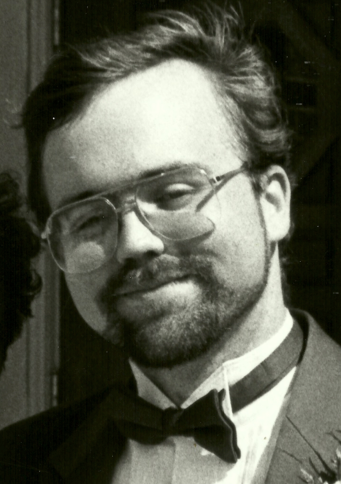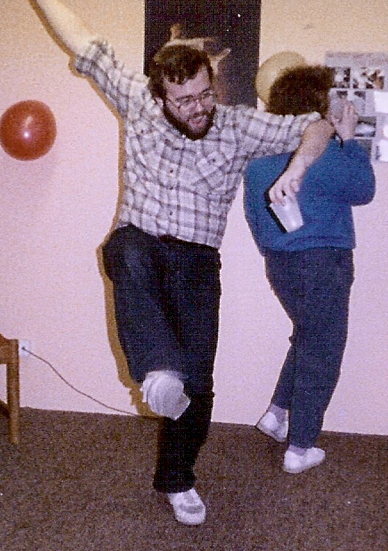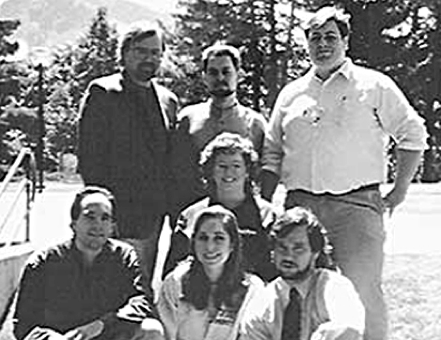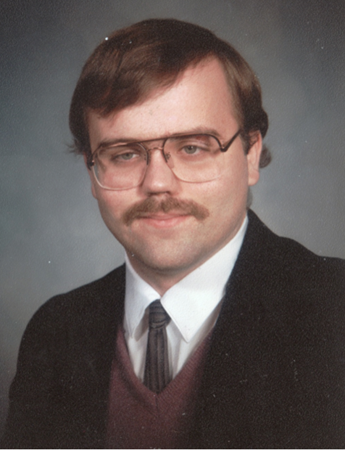Logging On - In Memoriam
Michael Salvo, Michael Day, Kris Blair, Cheryl Ball, Douglas Eyman
- In This Issue
- 2014 Kairos Awards
- KairosCast and ScholarNames
- Comings and Goings
- Remembering Mick Doherty
Kairos and Memoria: For Mick Doherty

On October 8, 2013, the founding editor of Kairos, Michael "Mick" Doherty, died from complications with diabetes. As news of Mick's death spread around the Internet, making its way from the TechRhet listserv to Facebook and Twitter, I sat stunned, feeling halfway around the world and disconnected from my Kairos peeps in the U.S. I took the rest of the day off and laid under the covers, mourning Mick's loss.
Over the years, my brain has tricked me into believing that I had actually met Mick once, at a bar in Chicago during a Kairos party. I remember his face so clearly--his dark moustache and beard, his square glasses, his wry smile--that I can hear the quip he made to me about being a newbie on staff. It would have been the 2002 conference, and I would have been on staff for less than a year at that point and "in the field" for less than two years. It is likely that, if that meeting had actually taken place, I would have had no idea who Mick was, just that he was someone who used to work on Kairos. From everything I hear from people who knew Mick and worked closely with him, that's the way he would have preferred I know him.

My false memory persists, reinforced years later by Mick friending me on Facebook and then gleefully ribbing me every time I mentioned Kairos. He was incredibly humble to the point of self-deprecation about this amazing journal he'd conceived, downplaying the role it plays now both nationally and internationally. I am not sure how connected he still felt to Kairos since he'd stopped working for the journal only a few years after starting it. I had hoped to find out when Doug and I asked him to write the forward for our book about Kairos, but the project got put on hold for a year, then another year, and we never got around to asking him. And that's our terrible loss, the journal's loss, the field's loss.
It's safe to say that I think about Mick every time I work on the journal, which is almost every daily. I am constantly amazed at the foresight he and others had to create the infrastructure--both social and technological--that makes Kairos the journal it is. That we've had to change so very little with regards to our editorial review processes, which have been open and collaborative since the first issue in January 1996, or our information architecture (e.g., you always know by whom, where, and when a Kairos piece has been published based on its URL) in the intervening decades shows that Mick and the original staff were able to implement a vision that most online journals still have difficulties with. Kairos is his festschrift.
--Cheryl
A Lesson in Design - Trust, Community, Innovation
I met Mick and the gang of soon-to-be Kairos editors at my first academic conference in 1995. What I remember most from that time of serendipitously meeting others who were interested in writing with computers is the drive and passion of the community to show the value of working in this new "World Wide Web" medium/platform, itself only a few years old and still largely uncommercialized. Mick thought that scholars ought to be as expert with crafting webtexts as they were with traditional forms of academic writing and argued that to really understand and research the effects of technology on writing, the scholar should be immersed in it; a digital ethnographer rather than a presumably objective bystander. (Of course, at the time, many compositionists actively sought to prevent instances of teaching writing in computer classrooms and would use the stance of objectivity to critique practices with which they had no direct experience.) So Mick created a space for scholars to engage these new technologies and to design scholarly work about teaching writing with these new tools by actually using the tools themselves.
I think that Kairos has survived (and prospered) as long as it has because of two key elements that Mick built in from the outset: A willingness to mentor writers who were experimenting with new forms of scholarly work and a commitment to collaboration. Mick didn't create the journal by himself—but he did assemble and lead the community that did. And this sense of collaborative work and community building has been the cornerstone of the volunteer labor offered over the years by our amazing staff members. I joined the journal unofficially during the production of issue 1.3 and officially became CoverWeb Editor with the first issue of our second year. What I remember about Mick's leadership style is that he approached challenges with wry humor and determination to solve problems or mediate conflicts and that he trusted the section and assistant editors to use sound judgment—his style was very much about delegation and trust, and that has deeply influenced the way that I run the journal: trust the staff and support the community that keeps us constantly improving and yet open to new ventures and experimentation. (Sometimes those new ventures are a long time coming; Mick would sometimes argue that if we kept to the same path too long, we should just go ahead and change the name of the journal to 'stasis').
Mick will always be with us in many ways, but for me, Kairos is the most resonant. And we shall honor his memory by continuing to build upon the foundations of trust, community, and innovation that he built into this grand undertaking.
--Doug
Eulogies for Mick Doherty
To further honor Mick's memory, Kairos has collected, thanks to Michael Day and Kris Blair, some of the tributes and eulogies presented by members of digital writing studies who knew him well. These are published below. If you have one you'd like us to add, please email us at kairosed at technorhetoric dot net.
I am deeply saddened and so many memories of Mick are racing through my mind. Most vivid is when Mick taught me HTML in the RPI church of servers—the Voorhees Computing Center.
With muted light streaming through narrow stained glass windows, I remember coding my first web page, and feeling the thrill of instantly publishing to this brand new public visual interface—a browser—giving a face to the World Wide Web and internet in 1994. What a long strange trip it's been.
--Michael Salvo
Michael Salvo further reflects on Mick's passing a month after its announcement on the TechRhet listserv:
I found myself looking through some old files. I blame Stuart Selber, who posted a FB image of his 1994 homepage and a 3.5" disk. Was that on a Mac Classic II? And I found myself thinking about Mick. And I know I'm not alone. So my thoughts revolve around this email exchange from June 1996...
http://kairos.technorhetoric.net/1.2/news/ibm/expletive.html
Perhaps the kairos of his passing has passed. I don't care. This link exemplifies the insanity of the original staff. And the insanity I was allowed to get away with from time to time. I'm sure it's more professionally and genially run now (cough cough). But it also brings me back to the issues that both brought Kairos together then made the early journal meaningful in its context, and made it possible to follow it out to all the versions it has become in the meantime.
I have a hard time believing still that we argued over whether the word "fuck" should appear not just in the journal but on the web. Interesting. Interesting to remember. And I think about all the craziness and inanity that made it move forward. Mick opens this discussion with reference to the CDA: The Communications Decency Act. First connection: George Carlin's seven words. Halfway through the email log here, I make reference to packing things up, and a flood of memory returns. I was packing up my small apartment of meager belongings at a rental house in Binghamton, NY and headed to Lubbock to begin my PhD work. I remember giving my skateboard to a local kid — you would have thought I handed him a stack of money. And the couple with the baby to whom I gave the wool blankets that would not be necessary in Lubbock. (I wish I had the big green one now, though.)
Sitting out there, dial-up phone line connected to a ratty Toshiba notebook computer, I was very much aware of unspooling time, of letting the day progress, of selling what little I wanted to divest myself of before making the trip south. It was a huge transition, and Mick was part of it.
I owe a lot of what I have since learned to him. Perhaps not directly, but he let me blast about and knock things over and get into trouble in ways that he just didn't let bother him. I still cannot believe he argued for censorship, even if he thought there were potential legal consequences for it. Cripes. The CDA. And we've seen Tahrir Square made possible by social media: did you catch Anthony Bordain in Libya talking to a Libyan freedom fighter about bringing NATO bombs to their targets through Twitter? Who would give a fuck about "fuck"? Was the CDA every enforced? Was it ever repealed? Fuck, I might be guilty in this message.
Ted and I, New Yorkers, crass, direct. Forget propriety. Tell the truth.
I loved working with Mick, and looking at some of these old emails (I have a bunch of the original staff emails, too — this selection was already public, and delicious, so what harm, right?) I realize I never did understand him, not totally. If at all. And I'd be lying if I said I wasn't a little angry, too, wrapped up with the feeling of sadness. Angry with him. Because I remember his unused exercise bike sitting in that great old Troy apartment building, collecting dust, collecting laundry. I slept on that apartment floor many nights putting the first two years of Kairos together, staring at that damned bike. Wondering if he'd ever ridden it. I loved working with Mick because he liked when we disagreed. I think he was as dumbfounded I would defend "fuck" just as surely as he was sure it should never, ever, ever for any reason appear in his beloved creation.
Mick didn't seem to care about his body. I asked him about it, about the bike, about exercise, about his blood sugar. He'd eat what he wanted. Check his sugar. Laugh when it went out of whack. I was nervous one afternoon — it was way high, and I had no clue what to do. "Well, if I pass out, call 911." So blasé. I guess these are the moments that come back to me, too, the impacts of the all-night pizza-fueled coding and copyediting sessions, the peanut butter on bagel mornings. Northern New York winters last for eight immobilizing months.
I rode 12 miles this morning in the freezing ass cold. Bill HD [Hart-Davidson] says riding keeps the voices out of his head, the nagging, the dark voices. Yeah, sometimes, but then this morning I was raging. Mad as hell. I had, perhaps, exchanged emails or FB messages once or twice a year with Mick over the last 10 years or so. But on this ride I was upset. His death has reminded me of my own mortality, fragility, my own unpedaled miles and unstepped steps, the quick dinners and empty calories, and the ritual tortures we put our bodies through to get the job done. I felt like I was mad at Mick, but I think it was a tad more existential: a little anger at being reminded so starkly that all this is temporary, and will end, and back to Burkean Parlors and disciplinarity. Amazing how powerfully we train the brain to return and retreat to comfortable and comforting thoughts rather than of the nothing and the abyss.
Mick—always Catholic—truly, powerfully believed he was headed to another life, one without daily blood pokes and sugar levels, insulin self-injections, and all the indignities of Type 1 diabetes. And I miss those heady days when our thoughts were about the next issue and the next feature and what image Jason Teague was going to come up with for the banners.
Perhaps this is all a bit too personal a remembrance for the public list, but we were tempered in public in the 90s, and I would like to think this bit of eulogizing would bring a mischievous grin to Mick's face. If he's right, he knows what I've done here, and if he's not—more likely in my estimation—I'm happy to have over-shared in his memory. Mick, you had terrible taste in music, but better taste in friends. I am proud to have been among them for a time, and will always remember the power of the web you revealed to me in the RPI church of computing.
-- Michael

On the occasion of Remembering Michael E. Doherty
The following memorials and eulogies for Mick were read by Michael Day at the 2014 Computers and Writing Conference in Pullman, Washington. Most were pulled from the TechRhet archives.
I am grateful to Michael Day for putting this memorial together, and I am very sorry to miss the community and camaraderie of being in the Palouse to memorialize Michael E. Doherty, who I have always known as Mick. Mick Doherty. In five minutes I can't even clear my throat or tell all the best inappropriate stories of Mick.
“...Rootin’ tooting’ six-gun shooting’ from the hip rhetorical madness we call Kairos…”
Mick gave me $20 for working this phrase into the Standing Room Only announcement of Kairos at C&W 1996 in Utah.I remember my first look at Mick's record collection. I can admit what most of you already know: I'm a music snob. Mick owned all 8 volumes of a K-Tel series called Jock Rock. So each time I made that drive from Binghamton to Troy, I brought records, CDs, and finally my first MP3 player. Mick wasn't interested. Hootie and the Blowfish: Darious Rucker is part of his memory, our memory, of putting the Kairos staff together. And now I am sad.
I remember Mick coaching the team that sang HTML to the tune of YMCA in Utah at the talent show. I pick on Mick’s taste in music, but he could follow through and make things happen. Mick loved rewriting lyrics and adding inside jokes, even convincing Kairos staff members to actually sing and dance at the talent show. That took all the available means of persuasion.At first I was mad at Mick when he died, but I think it was a tad more existential: a little anger at being reminded so starkly that all this is temporary, and will end. Mick—always Catholic—truly, powerfully believed he was headed to another life, one without daily blood pokes and measuring sugar levels, insulin self-injections, and all the indignities of Type 1 diabetes.
So I hate the disease that weakened and eventually took him. I am angered by the temporality of our existence. But I love the man I knew, and enjoy the community he introduced me to. I love you: all those gathered in his memory in the Palouse today. I miss my friend, but his gift to me, your gift to everyone gathered here and those who cannot make the trip, give the gift of community that we give to each other over and over again: that gift I cherish.
We are all mortal, short-lived individuals but we create a community that transcends individual limits. Mick's passing hurts but also reminds that he was part of something greater than himself; we are all part of something greater than our frail individual selves. And as I am grateful to have known Mick I am grateful to know you all and to know this community. So I thank Mick for bringing me to this community and thank each of you for remembering.
Mick, you had terrible taste in music and better taste in friends. I am proud to have been your friend for a time, and will always remember the power of the web you revealed to me in the RPI church of computing. Thank you.
Mick's passing reminds me of all the amazing, talented, gifted, generous colleagues I have had and who I miss dearly. We say goodbye to Mick, Carolyn Handa, and Linda Bergmann this year.
Michael Salvo
This is terrible news. I remember how much energy he always seemed to have during the early years of Kairos. He was a real force for change.
Mike Palmquist
Mick excelled at putting ideas into action, being one of the founders of Kairos shows that. But also, check out
http://wac.colostate.edu/rhetnet/hoops/, where Mick shared on RhetNet responses to questions asked for his doctoral preliminary exams at RPI. The experiment was to get feedback and comments to help prepare for his orals.Ingenious, generous, and never tried before. That was Mick.
Nick Carbone
I am so sad to hear this. He was such a presence and personified the best parts of the community ethos. We lost him once to the private sector and now this.
Mark Crane
I'm brokenhearted. I remember going to a Hootie and the Blowfish concert in Michigan, where Mick asked me "What would a totally online journal look like?" The resulting conversation set the stage for what would become Kairos. He knew how to follow through on a great idea.He got in trouble for posting his "hoops" exam posts, but I thought it was brilliant--it helped make the scary process of exam taking more transparent. He wasn't afraid to risk everything.
I was also one of his "groomsmen" at his wedding. He didn't let tradition/customs stand in his way.
When he chose industry over academia, it was our loss to be sure. Now that loss is universal.
My best wishes to his wife and family.
Becky Rickly
Dear colleagues,
I posted this on FB earlier. Mick would look askance if I didn't post it here too. Here will have to do, since we don't have MBU anymore...
Our friend and colleague, Mick Doherty , passed away from complications related to diabetes. I studied with Mick at Bowling Green, where we both found our way into the disciplinary discourse of rhetoric and writing just as computers and writing was becoming a thing.
Mike, as he was known to me, was first and foremost a generous and lighthearted person - two qualities that can be all too rare among graduate students and among academics in general! He hailed from an academic family "rotten with Ph.D.'s" as he would say, and that gave him a perspective on the academy that was equal parts calm perspective and wry humor. I personally benefited tremendously from this, as a first-generation college student, never quite sure what was business-as-usual and what wasn't. Mike helped me see a way to make an academic life and to do it with a sense of humor and a sense of
humility. I still try to encourage a lighter tone in my graduate seminars - to make room to laugh now and then - and I think of Mike often in those moments.Rest in peace Mike. We are grateful for all you gave us.
Bill Hart-Davidson
Just to follow in Bill's footsteps, here's what I posted on Facebook:I was surprised and saddened to learn Mick Doherty passed away, complications from diabetes. When I knew him back in Bowling Green, where he was in the MA program and I had started the PhD program, we all called him "Mike," and he was one of the people who got me interested in this whole "computers and writing" thing. And least we forget, he was one of the
founding editors/creators of Kairos: Rhetoric, Technology, Pedagogy, an electronic journal that started really on a hope and a dream and one that has of course become (IMO) one of the more important ones in the field.Mick left academia quite a while ago, and other than a Facebook post once in a rare while, I can't say that we kept in touch with each other or were ever particularly close. But he really was one of the people who pushed me down the path I'm still on, and for that, I thank him. Rest in peace, your time came too early.
Steve Krause

The Michael “Mick” Doherty Kairos Scholarship
After Michael Day read from the above memorials at C&W 2014, he invited Kris Blair to the podium to announce a scholarship in Mick's name at Bowling Green State University.
Tonight, I am here to represent the BGSU Rhetoric and Writing Program and share information about a graduate student scholarship being developed in Mick Doherty’s memory. Rhetoric and Writing Director Sue Carter Wood and I have been privileged to work closely with Doherty family on the scholarship description:
The Michael “Mick” Doherty Kairos Scholarship was initiated by Mick’s parents, Michael and Dorothy Doherty. As one of the founders of the web journal Kairos: A Journal of Rhetoric, Technology, and Pedagogy, Mick gave great attention to selecting as its name a concept from ancient rhetorical theory that highlights the need of a speaker to seize the moment, to act at the critical time, to understand all of the situational contexts, ultimately to voice what needs to be said in the right way to the right audience at the right moment. With a BA in Education and an MA in Rhetoric from Bowling Green State University, Mick was scholar, rhetor, and teacher in all his endeavors. These interests coalesced in his 1994 master’s thesis “Cyberwrite and Audience Accessed: Kairos Comes Online in the Composition Classroom.”
It is fitting, then, that this scholarship recognizes effectiveness, resourcefulness, creativity, and passion for teaching among doctoral students in Rhetoric & Writing in the English Department at Bowling Green State University. One scholarship will be awarded annually to a second or third-year doctoral student based on pedagogical successes and innovations.
A number of tributes have talked about Mick’s early departure from our community and our collective sense of loss as a result. What many of you may not know is that Mick’s intent was to return to the academy and to the field of computers and writing, as he was planning on beginning our Ph.D. program at Bowling Green. Tragically, his health prevented that possibility. He would have been a student in my digital rhetoric seminar last fall, and it is my great sadness that this did not happen.
Donations to the Michael “Mick” Doherty Kairos Scholarship can be made to
BGSU Foundation
Mileti Alumni Center
Bowling Green State University
Bowling Green, Ohio 43403
Please write: “English Department Mick Doherty Kairos Scholarship” in the memo line.
Kairos also donated $100 in Mick's memory to the American Diabetes Association last fall. Should you feel so moved, you can visit their website under Ways to Give.

